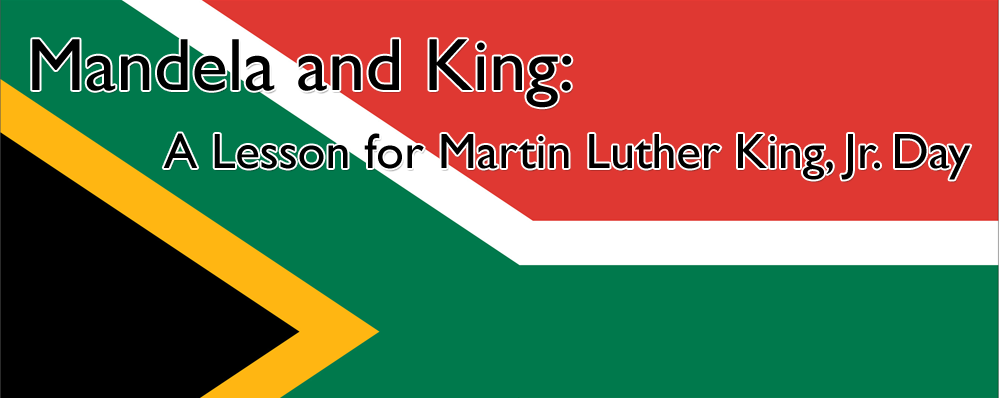


by Bill Bliss
Nelson Mandela and Martin Luther King, Jr. never met and they lived at opposite ends of the world, but their paths of struggle for civil rights in South Africa and the United States intersect as two of the twentieth century’s most important achievements in advancing human rights and freedom. As the holiday commemorating Dr. King approaches, it is a compelling time to consider the contributions of both of these extraordinary leaders.
A WebQuest
Here is an online research activity students can do to explore the lives and accomplishments of Martin Luther King, Jr. and Nelson Mandela. Students can work on their own or with a partner or small group to find the answers to these questions and then share as a class. Through this activity, they will discover some of the ways in which these two leaders had similar views and shared similar experiences during their remarkable lifetimes.
When was Martin Luther King, Jr. born, and where?
When was Nelson Mandela born, and where?
Both King and Mandela studied the philosophy of an important person in India. Who was it? Why was this person important? What one word commonly describes this person’s philosophy?
In 1963, Martin Luther King, Jr. went to jail for participating in a civil rights demonstration in Alabama.
What was the location of the jail?
How long was he imprisoned there?
He wrote something famous while he was there. What was it called, and what did it say?
In 1964, Nelson Mandela was sentenced to life in prison for protesting a system of separation of the races in South Africa.
What was this system of separation called?
What was the name and location of Mandela’s prison?
How long was he imprisoned there?
In that same year, what law was passed in the United States that guaranteed equality for people of all races?
What world prize did both Martin Luther King, Jr. and Nelson Mandela win?
When did each of them win this award?
When Nelson Mandela accepted this award, he ended his acceptance speech with this reference to Dr. King:
"Let the strivings of us all prove Martin Luther King, Jr. to have been correct when he said that humanity can no longer be tragically bound to the starless midnight of racism and war. Let the efforts of us all prove that he was not a mere dreamer when he spoke of the beauty of genuine brotherhood and peace being more precious than diamonds or silver or gold. Let a new age dawn!"
What is the name of the speech by Martin Luther King, Jr. that Mandela was referring to?
During what event did Dr. King give this speech?
When did it occur?
What are the famous lines at the end of the speech?
Nelson Mandela is often called the father of his country and the emancipator of his people. For this reason, which two U.S. presidents is he sometimes compared to?
How did Dr. King die in 1968? How old was he?
How old was Nelson Mandela when he died in 2013?
Online Resources
Before students go to their usual search engines to find answers for the WebQuest, encourage them to first explore some of the following primary web sources:
http://www.nps.gov/malu/index.htm
Martin Luther King, Jr. National Historic Site, Atlanta, Georgia
(The official site of the National Park Service)
The King Center (Library and Archives)
(The site includes a "dream map" and offers students an opportunity to add their dreams to the archive.)
South African official government site commemorating Nelson Mandela
(This site offers information about Mandela’s life, a picture gallery, and links to videos.)
A Note on Dr. King and South Africa
Dr. King was invited to speak at universities and religious organizations in South Africa in 1966, but the government refused to grant him an entry visa. In December 1965, he called for the United States and other countries to boycott South Africa to protest its rulers and its policy of racial separation. This boycott and the struggle for change within South Africa eventually led to the end of the policy and the establishment of a new form of government.
Enrichment: Two "What-Ifs"
What if Martin Luther King, Jr. had lived to the age of 95 as did Nelson Mandela? What do you think he would have accomplished? What might have been different in the United States in terms of civil rights? politics? society? (Have students share as a class.)
What if Martin Luther King, Jr. and Nelson Mandela met today? What would they talk about? What might they plan together? (Have students work in pairs to brainstorm and prepare a role-play to present to the class.)
Dr. King and the U.S. Citizenship Exam
Two of the current citizenship exam’s "100 questions" test students' knowledge of the civil rights movement and Martin Luther King, Jr.:
1. What movement tried to end racial discrimination? (The civil rights movement.)
2. What did Martin Luther King, Jr. do? (He fought for civil rights. / He worked for equality for all Americans.)
The Voices of Freedom citizenship text prepares students for these questions and offers other background information about the civil rights movement and Dr. King. You can view these lessons here. The text also prompts students to share their opinions about two questions: How do you think the civil rights movement of the 1950s and 1960s helps immigrants in the United States today? In your opinion, is there still discrimination in the United States?
Two Final Thoughts: Mandela and King on Education
"Education is the most powerful weapon which you can use to change the world."
Nelson Mandela
"The function of education is to teach one to think intensively and to think critically. Intelligence plus character –– that is the goal of true education."
Martin Luther King, Jr.